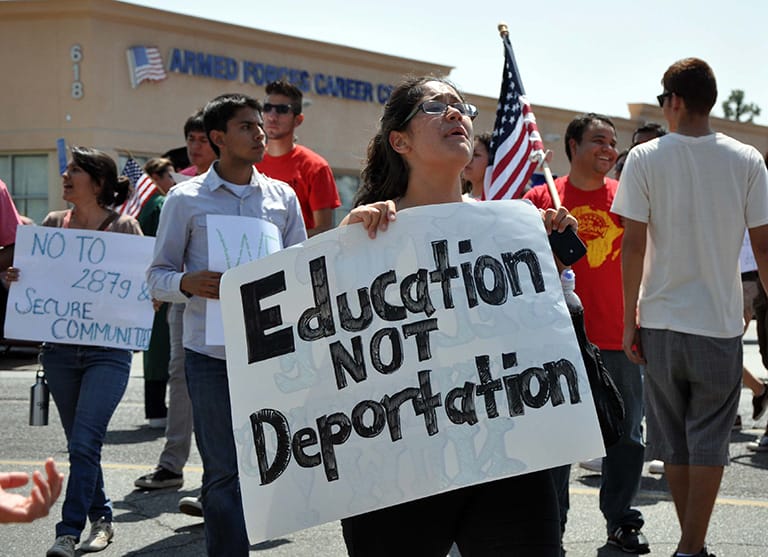Scholar-Activist Iliana Pérez Faces Uncertain DACA Status

By Roberto C. Hernandez
Iliana Guadalupe Pérez has a plan: Memorize the phone numbers of lawyers and pro-immigrant organizations. Leave an extra house key with a trusted friend. Save money for an emergency fund.
The 29-year-old School of Educational Studies (SES) doctoral student faces the possibility of being deported at any time, anywhere. It’s a threat that Pérez and tens of thousands of other undocumented graduate and undergraduate students are facing now more than ever.
An Obama-era initiative that provides a measure of protection from deportation for eligible young immigrants faces an uncertain future, leaving the educational fates of promising scholars and student leaders hanging in the balance.
But Pérez has been working for years to tip the scales. In a country that has always had a difficult time reconciling its immigrant heritage, she has tapped her personal experiences and academic expertise to develop resources, collaborate with advocates and activists, and engage in the national debate on the challenges faced by the young and undocumented.
“My parents taught me to find and create opportunity where none exists, think outside the box, take risks, and tackle challenges,” Pérez said.
A Moral Imperative
Deferred Action for Childhood Arrivals (DACA) is an Obama administration initiative established in 2012 that protects young undocumented immigrants who entered the country as minors from deportation. To be eligible, immigrants must be enrolled in school or have a high school diploma or GED, among other requirements.
While DACA is not a legal designation that provides a path to citizenship, it does give beneficiaries a legal presence that allows them to establish residency, gain work authorization, qualify for a driver’s license, and receive a Social Security number. DACA has provided a two-year renewable reprieve from deportation and eligibility for work authorization to more than 750,000 young adults.
But the policy’s future is uncertain under the current administration. One of President Donald Trump’s campaign promises was to end the policy. News of U.S. immigration authorities arresting hundreds of undocumented immigrants in high-profile raids across the country has prompted increasing anxiety and advocacy.
CGU Interim President Jacob Adams this year joined more than 600 university and college presidents in supporting DACA, calling for support from business, civic, religious, and nonprofit sectors.
“We make this request as a moral imperative and a national necessity,” Adams said. “America needs talent, energy, and commitment, and DACA serves that need. Its promise is evident on our own campus, and its reach encompasses students who, already, are part of our vibrant and diverse national and campus communities.”
But even before DACA, Pérez steadfastly pursued her own educational pathways.
Living in the Shadows
Born in Hidalgo, Mexico, Pérez, her brother, mother, and father traveled to the United States on a tourist visa when she was eight years old. The family settled in California’s Central Valley and became undocumented after their tourist visas expired.

She navigated through the public school system for a decade—the Supreme Court had ruled in 1982 that it was unconstitutional to deny undocumented immigrants access to public education. After high school, she secured a full-ride scholarship from a private nonprofit that enabled her to receive a bachelor’s degree in mathematics at California State University, Fresno.
She pursued graduate school, but her legal status made it next to impossible to get into a doctoral program. Pérez briefly attended The New School for Social Research in New York City to pursue a master’s degree, but the financial burden was overwhelming.
“At one point, I completely let go of the idea of graduate school,” she said.
Nevertheless, Pérez started working as an intern at Educators for Fair Consideration (E4FC), a Bay Area nonprofit that helps low-income minority youth and undocumented students go to college. Emboldened, she wrote Life After College for Undocumented Students in 2012. The 76-page online publication offers tips and advice—and hope—to students “living in the shadows,” with detailed sections on drafting a personal statement, internships, and strategic networking.
News outlets picked up on Pérez’s experiences and work. She was interviewed by Univision, Business Insider, CNN, the Huffington Post, and Spanish-language newspaper La Opinión, among other media outlets.
“Even to this day, a lot of individuals email me out of the blue and say, ‘Oh my god, this guide is so amazing. I’ve never seen a resource like this before,’” she said.
Shortly afterward, she met CGU Professor William Pérez, one of the nation’s leading experts on undocumented students.
Everything changed.
An Example To Follow
After learning about her experiences and educational aspirations, Professor Pérez invited her to apply for a doctoral program and invited her family on a campus tour. Through Professor Pérez’s influence, she was awarded the 21st Century Civil Rights Graduate Fellowship, which was established to support undocumented students interested in pursuing doctoral studies in Education at CGU.
What clinched the offer were Professor Pérez’s assurances that her studies would cross disciplines.
“At CGU, you can take economics classes, you can take political science,” she said. “You can pretty much create your own doctoral program very much focused on what you want to do and accomplish.”
Pérez received DACA status in 2013. In pursuing a PhD in Education Policy, Evaluation, and Reform, she also earned a Master’s in Economics in 2015.
Her research focuses on the occupational and educational attainment of immigrant students, the effects of deportation on the lives of young adults, immigrant entrepreneurs, and economics of immigration.
In January 2017, she published a guide to the IRS’s Individual Tax Identification Number (ITIN), which allows individuals without Social Security numbers a legal mechanism to pay income taxes, open bank accounts, and establish a business.
In addition to serving as a graduate research assistant and project manager for Professor Pérez, Pérez is currently a research analyst for Pitzer College’s Office of Institutional Research and Assessment and an entrepreneurship initiatives manager for E4FC.
Describing her as a “scholar activist,” Professor Pérez said, “She’s an example for other academics and scholars of immigration to follow.”